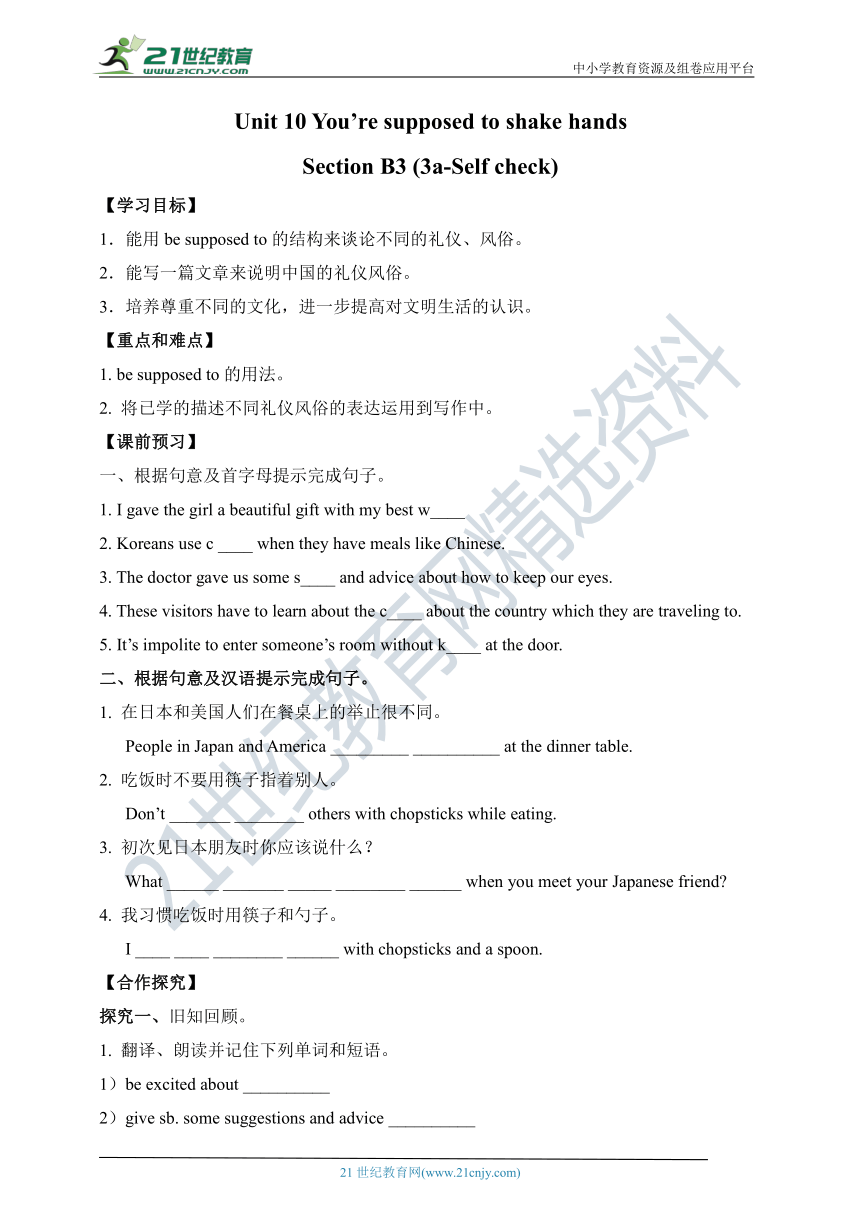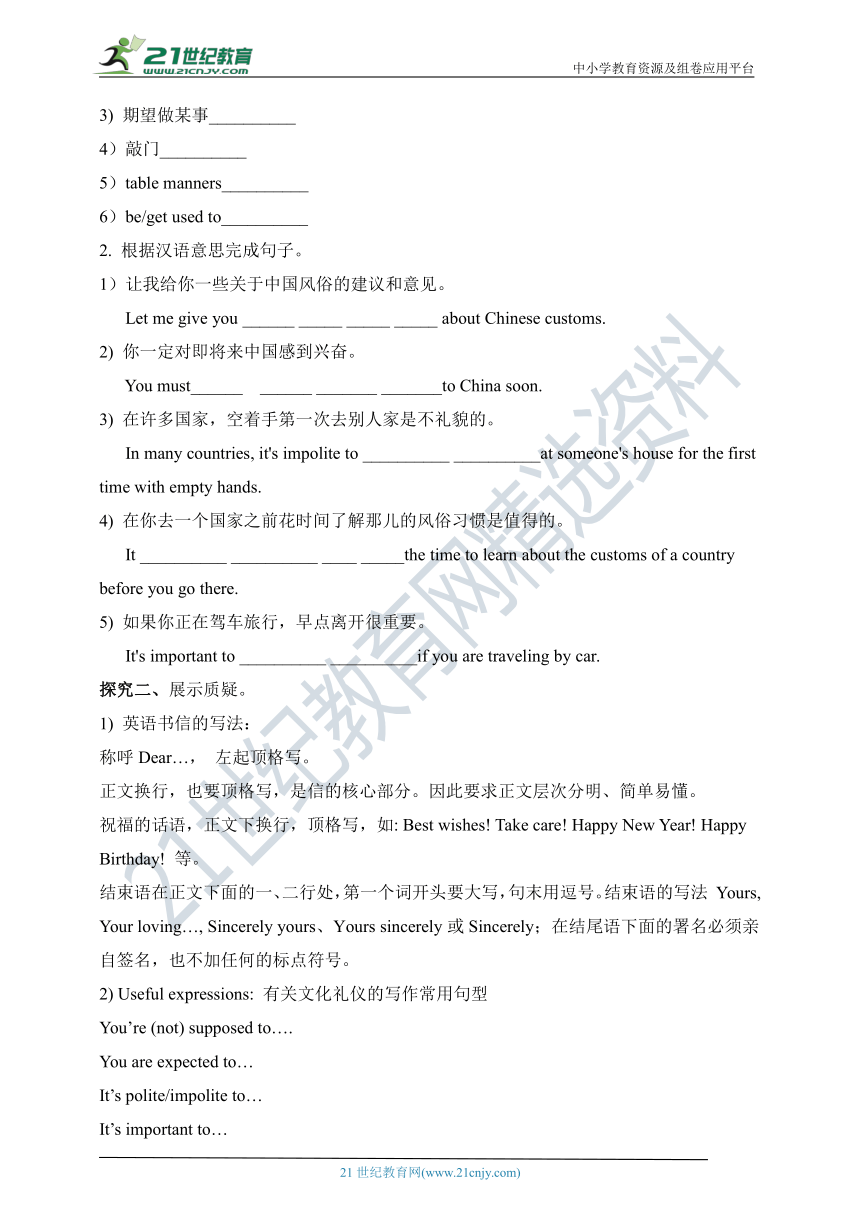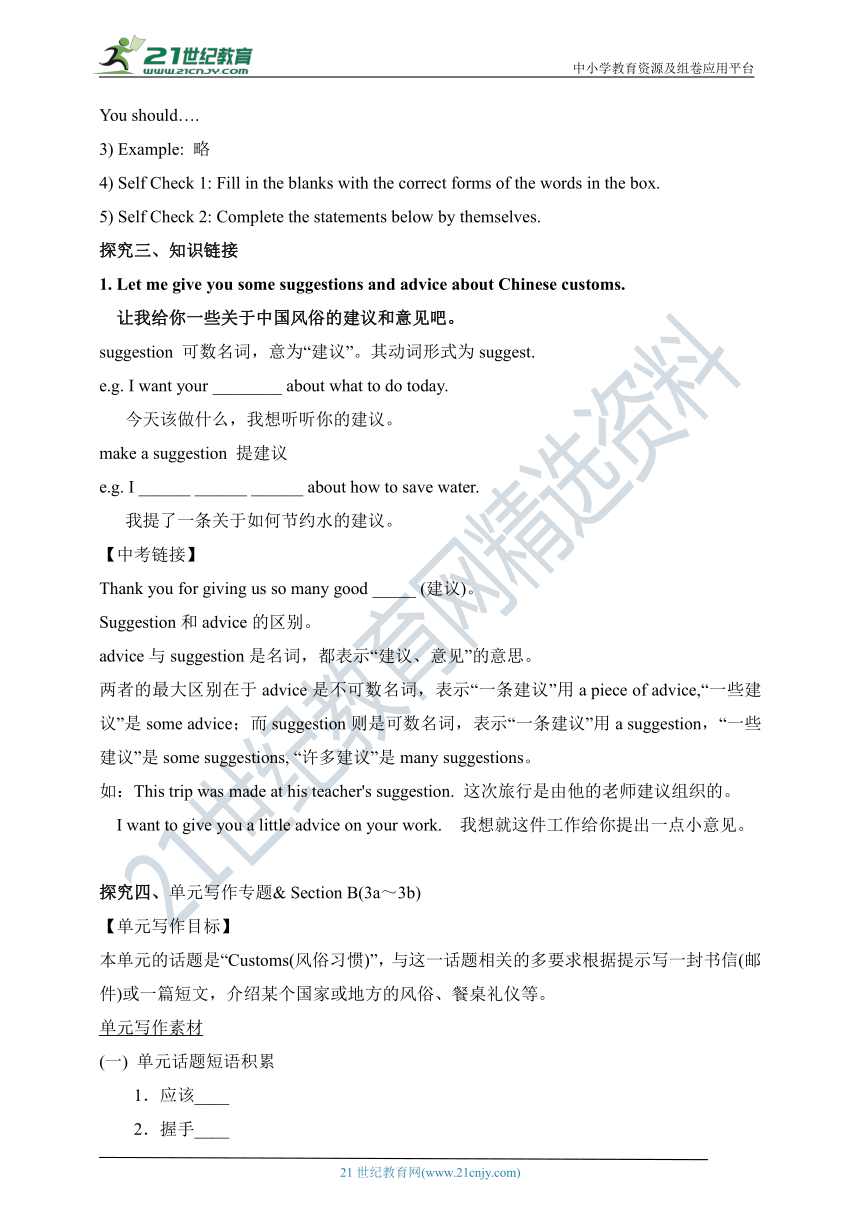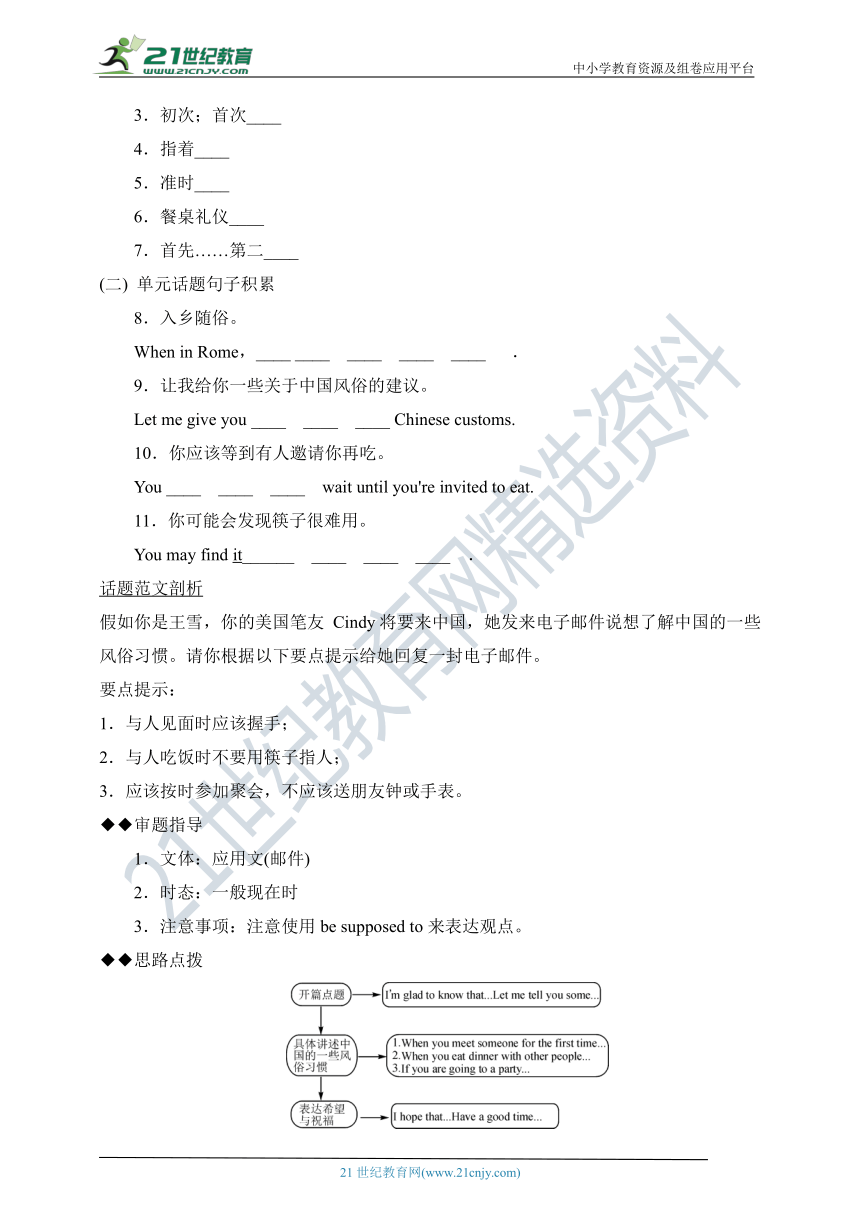Unit 10 You’re supposed to shake hands Section B3 (3a-Self check)优学案(含答案)
文档属性
| 名称 | Unit 10 You’re supposed to shake hands Section B3 (3a-Self check)优学案(含答案) |  | |
| 格式 | zip | ||
| 文件大小 | 1.1MB | ||
| 资源类型 | 试卷 | ||
| 版本资源 | 人教新目标(Go for it)版 | ||
| 科目 | 英语 | ||
| 更新时间 | 2019-08-13 11:48:44 | ||
图片预览





文档简介
Unit 10 You’re supposed to shake hands
Section B3 (3a-Self check)
【学习目标】
1.能用be supposed to的结构来谈论不同的礼仪、风俗。
2.能写一篇文章来说明中国的礼仪风俗。
3.培养尊重不同的文化,进一步提高对文明生活的认识。
【重点和难点】
1. be supposed to的用法。
2. 将已学的描述不同礼仪风俗的表达运用到写作中。
【课前预习】
一、根据句意及首字母提示完成句子。
1. I gave the girl a beautiful gift with my best w____
2. Koreans use c ____ when they have meals like Chinese.
3. The doctor gave us some s____ and advice about how to keep our eyes.
4. These visitors have to learn about the c____ about the country which they are traveling to.
5. It’s impolite to enter someone’s room without k____ at the door.
二、根据句意及汉语提示完成句子。
1. 在日本和美国人们在餐桌上的举止很不同。
People in Japan and America _________ __________ at the dinner table.
2. 吃饭时不要用筷子指着别人。
Don’t _______ ________ others with chopsticks while eating.
3. 初次见日本朋友时你应该说什么?
What ______ _______ _____ ________ ______ when you meet your Japanese friend?
4. 我习惯吃饭时用筷子和勺子。
I ____ ____ ________ ______ with chopsticks and a spoon.
【合作探究】
探究一、旧知回顾。
1. 翻译、朗读并记住下列单词和短语。
1)be excited about __________
2)give sb. some suggestions and advice __________
3) 期望做某事__________
4)敲门__________
5)table manners__________
6)be/get used to__________
2. 根据汉语意思完成句子。
1)让我给你一些关于中国风俗的建议和意见。
Let me give you ______ _____ _____ _____ about Chinese customs.
2) 你一定对即将来中国感到兴奋。
You must______ ______ _______ _______to China soon.
3) 在许多国家,空着手第一次去别人家是不礼貌的。
In many countries, it's impolite to __________ __________at someone's house for the first time with empty hands.
4) 在你去一个国家之前花时间了解那儿的风俗习惯是值得的。
It __________ __________ ____ _____the time to learn about the customs of a country before you go there.
5) 如果你正在驾车旅行,早点离开很重要。
It's important to __________ __________if you are traveling by car.
探究二、展示质疑。
1) 英语书信的写法:
称呼Dear…, 左起顶格写。
正文换行,也要顶格写,是信的核心部分。因此要求正文层次分明、简单易懂。
祝福的话语,正文下换行,顶格写,如: Best wishes! Take care! Happy New Year! Happy Birthday! 等。
结束语在正文下面的一、二行处,第一个词开头要大写,句末用逗号。结束语的写法 Yours, Your loving…, Sincerely yours、Yours sincerely或Sincerely;在结尾语下面的署名必须亲自签名,也不加任何的标点符号。
2) Useful expressions: 有关文化礼仪的写作常用句型
You’re (not) supposed to….
You are expected to…
It’s polite/impolite to…
It’s important to…
You should….
3) Example: 略
4) Self Check 1: Fill in the blanks with the correct forms of the words in the box.
5) Self Check 2: Complete the statements below by themselves.
探究三、知识链接
1. Let me give you some suggestions and advice about Chinese customs.
让我给你一些关于中国风俗的建议和意见吧。
suggestion 可数名词,意为“建议”。其动词形式为suggest.
e.g. I want your ________ about what to do today.
今天该做什么,我想听听你的建议。
make a suggestion 提建议
e.g. I ______ ______ ______ about how to save water.
我提了一条关于如何节约水的建议。
【中考链接】
Thank you for giving us so many good _____ (建议)。
Suggestion和advice的区别。
advice与suggestion是名词,都表示“建议、意见”的意思。
两者的最大区别在于advice是不可数名词,表示“一条建议”用a piece of advice,“一些建议”是some advice;而suggestion则是可数名词,表示“一条建议”用a suggestion,“一些建议”是some suggestions, “许多建议”是many suggestions。
如:This trip was made at his teacher's suggestion. 这次旅行是由他的老师建议组织的。
I want to give you a little advice on your work. 我想就这件工作给你提出一点小意见。
探究四、单元写作专题& Section B(3a~3b)
【单元写作目标】
本单元的话题是“Customs(风俗习惯)”,与这一话题相关的多要求根据提示写一封书信(邮件)或一篇短文,介绍某个国家或地方的风俗、餐桌礼仪等。
单元写作素材
(一) 单元话题短语积累
1.应该____
2.握手____
3.初次;首次____
4.指着____
5.准时____
6.餐桌礼仪____
7.首先……第二____
(二) 单元话题句子积累
8.入乡随俗。
When in Rome,____ ____ ____ ____ ____ .
9.让我给你一些关于中国风俗的建议。
Let me give you ____ ____ ____ Chinese customs.
10.你应该等到有人邀请你再吃。
You ____ ____ ____ wait until you're invited to eat.
11.你可能会发现筷子很难用。
You may find it______ ____ ____ ____ .
话题范文剖析
假如你是王雪,你的美国笔友 Cindy将要来中国,她发来电子邮件说想了解中国的一些风俗习惯。请你根据以下要点提示给她回复一封电子邮件。
要点提示:
1.与人见面时应该握手;
2.与人吃饭时不要用筷子指人;
3.应该按时参加聚会,不应该送朋友钟或手表。
◆◆审题指导
1.文体:应用文(邮件)
2.时态:一般现在时
3.注意事项:注意使用be supposed to来表达观点。
◆◆思路点拨
◆◆范文欣赏
Dear Cindy,
I'm glad to know that you are coming to China. China is a country with a long history,so there are many customs here. Let me give you some suggestions about Chinese customs.
Firstly,you are supposed to shake hands when you meet someone for the first time. Secondly,when you eat dinner with other people,it's rude to point at others with your chopsticks. And don't make any noise when you have your soup. Besides,if you are going to a party,you are supposed to arrive at the party on time,or a few minutes earlier. You are not supposed to give a clock or a watch to a friend as a present,because that means “death” in Chinese.
I hope that these tips are useful. Have a good time in China!
Best wishes!
Yours,
Wang Xue
单元写作练笔
假如你是王洁,你的美国朋友Jenny发电子邮件想向你了解中国的就餐文化,请你根据电子邮件的内容回复她。
Dear Wang Jie,
I'm going to China.I will probably be invited to a dinner.But I'm worried about what I should and shouldn't do as a guest during the dinner.Please give me some advice.
I'm looking forward to your reply.
Yours,
Jenny
要求:100词左右,电子邮件的格式、开头及结尾已给出,不计入总词数。
__________________________________________________________________________________________________________________________________________
_____________________________________________________________________
_____________________________________________________________________
【课时小结】
重点单词
suggestion n. 建议
重点词组
1. be excited about对……感到激动
2. give sb. some suggestions and advice给某人一些建议
3. look forward to doing sth. 期望做某事
4. show up出现
5. knock on the door 敲门
6. make sb. mad使某人生气
重点句式
1. You must be excited about coming to China soon.你一定对即将来中国感到兴奋。
2. In many countries, it is impolite to show up at someone’s house for the first time with empty hands.
在许多国家,空着手第一次到别人家是不礼貌的。
3. It is worth spending the time to learn about the customs of a country before you go there.
在你去一个国家之前花时间了解那儿的风俗习惯是值得的。
4. You will know what you are supposed to do in different situations.
你将知道在不同的情景你应该做什么。
5. It is important to leave earlier if you are traveling by car.
如果你正在驾车旅行,早点离开很重要。
【达标检测】
一. 用所给单词的适当形式填空。
1. It’s ______________ (polite) to eat while walking down the road.
2. Let me give you some _________ (suggestion) about staying in my home and some _______ (advice) about China.
3. I look forward to ________ (meet) you soon!
4. It is worth _______ (spend) the time to learn about the customs of a country before you go there.
5. Sandy went into her sister’s room without _________ (knock) on the door.
二. 单项选择。
1. You should shake _____ her, because you are in China.
A. hand with B. hands with C. hand to D. hands to
2. You should_______ watched TV. There is so much work to do,
A. not have B. have not C. not D. not having
3. Without ________ a word, the man left in a hurry.
A. saying B. to say C. said D. says
4. It’s impolite __________ your chopsticks into your food in Japan.
A. to stick B. stuck C. sticks D. sticking
5. We go to school every day _____ Saturday and Sunday.
A. beside B. besides C. except D. except for
6. —Will you come to the dinner party?
—I will not come until Jenny __________.
A. will be invited B. can be invited C. invited D. is invited
7. John _______ Beijing the day before yesterday.
A. arrived at B. arrived C. reached to D. arrived in
8. I find ________ difficult to remember everything, though I’m still young.
A. that B. this C. it D. what
9. He _____ at the last party. He felt sorry for it.
A. makes some mistakes B. make a mistake
C. made few mistakes D. made many mistakes
10. —Is it easy for people from different countries to greet each other?
—I don’t think so. Because different countries have different _______.
A. clothes B. food C. way D. customs
三. 用方框内所给词的适当形式填空。
pick up , cut up, be supposed to, after all, hang out, drop by,
table manners, be used to, shake hands, dress up
1. You ______ ask the teacher if you want to leave the classroom.
2. You should________ when you meet someone for the first time.
3. ____________ well whenever you’re in the area.
4. Don’t laugh at him! ___________,he is so young.
5. She kept___________ magazines and putting them down again.
6. I don’t know about ___________ in your country.
7. The boy__________ getting up early.
8. Don’t __________ the apples.
9. My friends often _________ in the mall.
10. The children in China often _________ their grandparents in the Spring Festival.
四. 根据句意及汉语提示完成句子。
1. 在日本和美国人们在餐桌上的举止很不同。
People in Japan and America _________ __________ at the dinner table.
2. 吃饭时不要用筷子指着别人。
Don’t _______ ________ others with chopsticks while eating.
3. 初次见日本朋友时你应该说什么?
What ______ _______ _______ ________ ______ when you first meet your Japanese friend?
4. 我习惯吃饭时用筷子和勺子。
I _______ _______ ________ _________ with chopsticks and a spoon.
五. 阅读简答。
The main difference between China and Western countries on the dinner table is the tableware (餐具), but that’s just a small difference. In quite good restaurant, you can always ask for a pair of knife and fork, if you find the chopsticks are not helpful enough.
The real difference is whether people share food on the same plate. In the West, you have your own plate of food ,while in China the dishes are placed in the middle of table and everyone shares. 58 In China, the meal usually begins with a set of at least four cold dishes, followed by hot meat and vegetable dishes. Soup is then served, followed by rice, noodles or dumplings. Perhaps what surprises Western visitors most is that Chinese hosts like to put food into the plates of their guests. In formal dinners, there are always. “Public” chopsticks and spoons, but some hosts may use their own chopsticks. This is a sign of politeness. It is always polite to eat the food.
People in China tend to order more food than they could eat. 59 They will think it embarrassing if all the food is eaten.
(一) 根据短文内容简要回答问题
1. What’s the real difference between Chinese and Western table manners?
___________________________________________________________
2. What may make Western guests feel surprised when they have dinner in a Chinese family?
___________________________________________________________
(二) 将短文中划线的句子译成汉语.
3._________________________________________________________ 4._________________________________________________________
(三) 请给短文拟一个适当的标题.
5._________________________________________________________
【自我评价】
1. 本课我学会了什么?
_________________________________________________________________
2. 通过本课的学习,我还有哪些疑问?
_________________________________________________________________
参考答案:
【课前预习】
一、
wishes.
Chopsticks
Suggestions
Customs
Knocking
二
1. behave differently 2. point at 3.are you supposed to say 4.am used to eating
探究一
为…感到激动;关于……而兴奋
给某人一些建议
Expect to do sth.
Knock at the door
餐桌礼仪
习惯做…
some suggestions and advice
be excited about coming
show up?
is worth spending
clear off
探究三
suggestions;made a suggestion;suggestions
探究四
be supposed to/be expected to
shake hands
for the first time
point at
(be) on time
table manners
firstly… secondly
do as the Romans do
some suggestions about
should/are supposed to
difficult/hard to use chopsticks
Dear Jenny,
I'm so glad you're coming to China! Before you come,you should know about table manners in our country. Here is some advice.
If you're invited to a dinner,there will be a lot of different dishes,not just three courses. You may find it difficult to use chopsticks if you haven't tried before. It's a good idea to get some practice before you come. Firstly,when the food is served,you are not supposed to start eating first if there are older people at the table. Secondly,you shouldn't stick your chopsticks into your food and pointing anyone with your chopsticks is impolite. Besides,don't make any noise when you have your soup. Lastly, you should say “thank you” after dinner.
I hope this is helpful. E-mail me if you have any other questions.
Yours,
Wang Jie
【达标检测】
一、1. impolite 2. suggestions; advice 3. meeting 4. spending 5. knocking
二、1. B 2. A 3. A 4. A 5. C 6. D 7. D 8. C 9. D 10. D
三、1. are supposed to 2. shake hands 3. Dress up 4. After all 5. picking up
6. table manners 7. is used to 8. cut up 9. hang out 10. drop by
四、 1. behave differently 2. point at
3. are you supposed to say 4. am used to eating
五、1. If people share food on the same plate
2. The Chinese hosts put food into the plates of their guests
3. 在中国,常以至少4道凉菜开餐。
4. 如果食物都吃完了,他们会觉得尴尬。
5. 60 different table manners
Section B3 (3a-Self check)
【学习目标】
1.能用be supposed to的结构来谈论不同的礼仪、风俗。
2.能写一篇文章来说明中国的礼仪风俗。
3.培养尊重不同的文化,进一步提高对文明生活的认识。
【重点和难点】
1. be supposed to的用法。
2. 将已学的描述不同礼仪风俗的表达运用到写作中。
【课前预习】
一、根据句意及首字母提示完成句子。
1. I gave the girl a beautiful gift with my best w____
2. Koreans use c ____ when they have meals like Chinese.
3. The doctor gave us some s____ and advice about how to keep our eyes.
4. These visitors have to learn about the c____ about the country which they are traveling to.
5. It’s impolite to enter someone’s room without k____ at the door.
二、根据句意及汉语提示完成句子。
1. 在日本和美国人们在餐桌上的举止很不同。
People in Japan and America _________ __________ at the dinner table.
2. 吃饭时不要用筷子指着别人。
Don’t _______ ________ others with chopsticks while eating.
3. 初次见日本朋友时你应该说什么?
What ______ _______ _____ ________ ______ when you meet your Japanese friend?
4. 我习惯吃饭时用筷子和勺子。
I ____ ____ ________ ______ with chopsticks and a spoon.
【合作探究】
探究一、旧知回顾。
1. 翻译、朗读并记住下列单词和短语。
1)be excited about __________
2)give sb. some suggestions and advice __________
3) 期望做某事__________
4)敲门__________
5)table manners__________
6)be/get used to__________
2. 根据汉语意思完成句子。
1)让我给你一些关于中国风俗的建议和意见。
Let me give you ______ _____ _____ _____ about Chinese customs.
2) 你一定对即将来中国感到兴奋。
You must______ ______ _______ _______to China soon.
3) 在许多国家,空着手第一次去别人家是不礼貌的。
In many countries, it's impolite to __________ __________at someone's house for the first time with empty hands.
4) 在你去一个国家之前花时间了解那儿的风俗习惯是值得的。
It __________ __________ ____ _____the time to learn about the customs of a country before you go there.
5) 如果你正在驾车旅行,早点离开很重要。
It's important to __________ __________if you are traveling by car.
探究二、展示质疑。
1) 英语书信的写法:
称呼Dear…, 左起顶格写。
正文换行,也要顶格写,是信的核心部分。因此要求正文层次分明、简单易懂。
祝福的话语,正文下换行,顶格写,如: Best wishes! Take care! Happy New Year! Happy Birthday! 等。
结束语在正文下面的一、二行处,第一个词开头要大写,句末用逗号。结束语的写法 Yours, Your loving…, Sincerely yours、Yours sincerely或Sincerely;在结尾语下面的署名必须亲自签名,也不加任何的标点符号。
2) Useful expressions: 有关文化礼仪的写作常用句型
You’re (not) supposed to….
You are expected to…
It’s polite/impolite to…
It’s important to…
You should….
3) Example: 略
4) Self Check 1: Fill in the blanks with the correct forms of the words in the box.
5) Self Check 2: Complete the statements below by themselves.
探究三、知识链接
1. Let me give you some suggestions and advice about Chinese customs.
让我给你一些关于中国风俗的建议和意见吧。
suggestion 可数名词,意为“建议”。其动词形式为suggest.
e.g. I want your ________ about what to do today.
今天该做什么,我想听听你的建议。
make a suggestion 提建议
e.g. I ______ ______ ______ about how to save water.
我提了一条关于如何节约水的建议。
【中考链接】
Thank you for giving us so many good _____ (建议)。
Suggestion和advice的区别。
advice与suggestion是名词,都表示“建议、意见”的意思。
两者的最大区别在于advice是不可数名词,表示“一条建议”用a piece of advice,“一些建议”是some advice;而suggestion则是可数名词,表示“一条建议”用a suggestion,“一些建议”是some suggestions, “许多建议”是many suggestions。
如:This trip was made at his teacher's suggestion. 这次旅行是由他的老师建议组织的。
I want to give you a little advice on your work. 我想就这件工作给你提出一点小意见。
探究四、单元写作专题& Section B(3a~3b)
【单元写作目标】
本单元的话题是“Customs(风俗习惯)”,与这一话题相关的多要求根据提示写一封书信(邮件)或一篇短文,介绍某个国家或地方的风俗、餐桌礼仪等。
单元写作素材
(一) 单元话题短语积累
1.应该____
2.握手____
3.初次;首次____
4.指着____
5.准时____
6.餐桌礼仪____
7.首先……第二____
(二) 单元话题句子积累
8.入乡随俗。
When in Rome,____ ____ ____ ____ ____ .
9.让我给你一些关于中国风俗的建议。
Let me give you ____ ____ ____ Chinese customs.
10.你应该等到有人邀请你再吃。
You ____ ____ ____ wait until you're invited to eat.
11.你可能会发现筷子很难用。
You may find it______ ____ ____ ____ .
话题范文剖析
假如你是王雪,你的美国笔友 Cindy将要来中国,她发来电子邮件说想了解中国的一些风俗习惯。请你根据以下要点提示给她回复一封电子邮件。
要点提示:
1.与人见面时应该握手;
2.与人吃饭时不要用筷子指人;
3.应该按时参加聚会,不应该送朋友钟或手表。
◆◆审题指导
1.文体:应用文(邮件)
2.时态:一般现在时
3.注意事项:注意使用be supposed to来表达观点。
◆◆思路点拨
◆◆范文欣赏
Dear Cindy,
I'm glad to know that you are coming to China. China is a country with a long history,so there are many customs here. Let me give you some suggestions about Chinese customs.
Firstly,you are supposed to shake hands when you meet someone for the first time. Secondly,when you eat dinner with other people,it's rude to point at others with your chopsticks. And don't make any noise when you have your soup. Besides,if you are going to a party,you are supposed to arrive at the party on time,or a few minutes earlier. You are not supposed to give a clock or a watch to a friend as a present,because that means “death” in Chinese.
I hope that these tips are useful. Have a good time in China!
Best wishes!
Yours,
Wang Xue
单元写作练笔
假如你是王洁,你的美国朋友Jenny发电子邮件想向你了解中国的就餐文化,请你根据电子邮件的内容回复她。
Dear Wang Jie,
I'm going to China.I will probably be invited to a dinner.But I'm worried about what I should and shouldn't do as a guest during the dinner.Please give me some advice.
I'm looking forward to your reply.
Yours,
Jenny
要求:100词左右,电子邮件的格式、开头及结尾已给出,不计入总词数。
__________________________________________________________________________________________________________________________________________
_____________________________________________________________________
_____________________________________________________________________
【课时小结】
重点单词
suggestion n. 建议
重点词组
1. be excited about对……感到激动
2. give sb. some suggestions and advice给某人一些建议
3. look forward to doing sth. 期望做某事
4. show up出现
5. knock on the door 敲门
6. make sb. mad使某人生气
重点句式
1. You must be excited about coming to China soon.你一定对即将来中国感到兴奋。
2. In many countries, it is impolite to show up at someone’s house for the first time with empty hands.
在许多国家,空着手第一次到别人家是不礼貌的。
3. It is worth spending the time to learn about the customs of a country before you go there.
在你去一个国家之前花时间了解那儿的风俗习惯是值得的。
4. You will know what you are supposed to do in different situations.
你将知道在不同的情景你应该做什么。
5. It is important to leave earlier if you are traveling by car.
如果你正在驾车旅行,早点离开很重要。
【达标检测】
一. 用所给单词的适当形式填空。
1. It’s ______________ (polite) to eat while walking down the road.
2. Let me give you some _________ (suggestion) about staying in my home and some _______ (advice) about China.
3. I look forward to ________ (meet) you soon!
4. It is worth _______ (spend) the time to learn about the customs of a country before you go there.
5. Sandy went into her sister’s room without _________ (knock) on the door.
二. 单项选择。
1. You should shake _____ her, because you are in China.
A. hand with B. hands with C. hand to D. hands to
2. You should_______ watched TV. There is so much work to do,
A. not have B. have not C. not D. not having
3. Without ________ a word, the man left in a hurry.
A. saying B. to say C. said D. says
4. It’s impolite __________ your chopsticks into your food in Japan.
A. to stick B. stuck C. sticks D. sticking
5. We go to school every day _____ Saturday and Sunday.
A. beside B. besides C. except D. except for
6. —Will you come to the dinner party?
—I will not come until Jenny __________.
A. will be invited B. can be invited C. invited D. is invited
7. John _______ Beijing the day before yesterday.
A. arrived at B. arrived C. reached to D. arrived in
8. I find ________ difficult to remember everything, though I’m still young.
A. that B. this C. it D. what
9. He _____ at the last party. He felt sorry for it.
A. makes some mistakes B. make a mistake
C. made few mistakes D. made many mistakes
10. —Is it easy for people from different countries to greet each other?
—I don’t think so. Because different countries have different _______.
A. clothes B. food C. way D. customs
三. 用方框内所给词的适当形式填空。
pick up , cut up, be supposed to, after all, hang out, drop by,
table manners, be used to, shake hands, dress up
1. You ______ ask the teacher if you want to leave the classroom.
2. You should________ when you meet someone for the first time.
3. ____________ well whenever you’re in the area.
4. Don’t laugh at him! ___________,he is so young.
5. She kept___________ magazines and putting them down again.
6. I don’t know about ___________ in your country.
7. The boy__________ getting up early.
8. Don’t __________ the apples.
9. My friends often _________ in the mall.
10. The children in China often _________ their grandparents in the Spring Festival.
四. 根据句意及汉语提示完成句子。
1. 在日本和美国人们在餐桌上的举止很不同。
People in Japan and America _________ __________ at the dinner table.
2. 吃饭时不要用筷子指着别人。
Don’t _______ ________ others with chopsticks while eating.
3. 初次见日本朋友时你应该说什么?
What ______ _______ _______ ________ ______ when you first meet your Japanese friend?
4. 我习惯吃饭时用筷子和勺子。
I _______ _______ ________ _________ with chopsticks and a spoon.
五. 阅读简答。
The main difference between China and Western countries on the dinner table is the tableware (餐具), but that’s just a small difference. In quite good restaurant, you can always ask for a pair of knife and fork, if you find the chopsticks are not helpful enough.
The real difference is whether people share food on the same plate. In the West, you have your own plate of food ,while in China the dishes are placed in the middle of table and everyone shares. 58 In China, the meal usually begins with a set of at least four cold dishes, followed by hot meat and vegetable dishes. Soup is then served, followed by rice, noodles or dumplings. Perhaps what surprises Western visitors most is that Chinese hosts like to put food into the plates of their guests. In formal dinners, there are always. “Public” chopsticks and spoons, but some hosts may use their own chopsticks. This is a sign of politeness. It is always polite to eat the food.
People in China tend to order more food than they could eat. 59 They will think it embarrassing if all the food is eaten.
(一) 根据短文内容简要回答问题
1. What’s the real difference between Chinese and Western table manners?
___________________________________________________________
2. What may make Western guests feel surprised when they have dinner in a Chinese family?
___________________________________________________________
(二) 将短文中划线的句子译成汉语.
3._________________________________________________________ 4._________________________________________________________
(三) 请给短文拟一个适当的标题.
5._________________________________________________________
【自我评价】
1. 本课我学会了什么?
_________________________________________________________________
2. 通过本课的学习,我还有哪些疑问?
_________________________________________________________________
参考答案:
【课前预习】
一、
wishes.
Chopsticks
Suggestions
Customs
Knocking
二
1. behave differently 2. point at 3.are you supposed to say 4.am used to eating
探究一
为…感到激动;关于……而兴奋
给某人一些建议
Expect to do sth.
Knock at the door
餐桌礼仪
习惯做…
some suggestions and advice
be excited about coming
show up?
is worth spending
clear off
探究三
suggestions;made a suggestion;suggestions
探究四
be supposed to/be expected to
shake hands
for the first time
point at
(be) on time
table manners
firstly… secondly
do as the Romans do
some suggestions about
should/are supposed to
difficult/hard to use chopsticks
Dear Jenny,
I'm so glad you're coming to China! Before you come,you should know about table manners in our country. Here is some advice.
If you're invited to a dinner,there will be a lot of different dishes,not just three courses. You may find it difficult to use chopsticks if you haven't tried before. It's a good idea to get some practice before you come. Firstly,when the food is served,you are not supposed to start eating first if there are older people at the table. Secondly,you shouldn't stick your chopsticks into your food and pointing anyone with your chopsticks is impolite. Besides,don't make any noise when you have your soup. Lastly, you should say “thank you” after dinner.
I hope this is helpful. E-mail me if you have any other questions.
Yours,
Wang Jie
【达标检测】
一、1. impolite 2. suggestions; advice 3. meeting 4. spending 5. knocking
二、1. B 2. A 3. A 4. A 5. C 6. D 7. D 8. C 9. D 10. D
三、1. are supposed to 2. shake hands 3. Dress up 4. After all 5. picking up
6. table manners 7. is used to 8. cut up 9. hang out 10. drop by
四、 1. behave differently 2. point at
3. are you supposed to say 4. am used to eating
五、1. If people share food on the same plate
2. The Chinese hosts put food into the plates of their guests
3. 在中国,常以至少4道凉菜开餐。
4. 如果食物都吃完了,他们会觉得尴尬。
5. 60 different table manners
同课章节目录
- Unit 1 How can we become good learners.
- Section A
- Section B
- Unit 2 I think that mooncakes are delicious!
- Section A
- Section B
- Unit 3 Could you please tell me where the restroom
- Section A
- Section B
- Unit 4 I used to be afraid of the dark.
- Section A
- Section B
- Unit 5 What are the shirts made of?
- Section A
- Section B
- Review of Units 1-5
- Unit 6 When was it invented?
- Section A
- Section B
- Unit 7 Teenagers should be allowed to choose their
- Section A
- Section B
- Unit 8 It must belong to Carla.
- Section A
- Section B
- Unit 9 I like music that I can dance to.
- Section A
- Section B
- Unit 10 You're supposed to shake hands.
- Section A
- Section B
- Review of Units 6-10
- Unit 11 Sad movies make me cry.
- Section A
- Section B
- Unit 12 Life is full of the unexpected
- Section A
- Section B
- Unit 13 We're trying to save the earth!
- Section A
- Section B
- Unit 14 I remember meeting all of you in Grade 7.
- Section A
- Section B
- Review of Units 11-14
